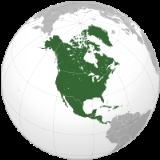
1497 John Cabot lands in North America at Newfoundland leading the first European exploration of the region since the Vikings.
1527 The first known letter from North America is sent by John Rut while at St. John's, Newfoundland.
1535 French explorer Jacques Cartier sets sail on his second voyage to North America with three ships, 110 men, and Chief Donnacona's two sons (whom Cartier had kidnapped during his first voyage).
1583 Sir Humphrey Gilbert establishes the first English colony in North America, at what is now St John's, Newfoundland.
1620 The ''Mayflower'' departs from Southampton, England on its first attempt to reach North America.
1620 The Pilgrims sail from Plymouth, England, on the ''Mayflower'' to settle in North America. (Old Style date; September 16 per New Style date.)
1652 Rhode Island passes the first law in North America making slavery illegal.
1670 King Charles II of England grants a permanent charter to the Hudson's Bay Company to open up the fur trade in North America.
1679 The brigantine ''Le Griffon'', commissioned by René Robert Cavelier, Sieur de La Salle, is towed to the south-eastern end of the Niagara River, to become the first ship to sail the upper Great Lakes of North America.
1683 William Penn brings 13 German immigrant families to the colony of Pennsylvania, marking the first major immigration of German people to America.
1700 The magnitude 9 Cascadia Earthquake takes place off the west coast of the North America, as evidenced by Japanese records.
1738 North America: French explorer Pierre Gaultier de Varennes et de la Vérendrye reaches the western shore of Lake Michigan.
1739 Stono Rebellion, the largest slave uprising in Britain's mainland North American colonies prior to the American Revolution, erupts near Charleston, South Carolina.
1751 The first cricket match is played in America.
1763 George III of Great Britain issues British Royal Proclamation of 1763, closing aboriginal lands in North America north and west of Alleghenies to white settlements.
1765 The British Parliament enacts the Stamp Act on the 13 colonies in order to help pay for British military operations in North America.
1773 The Parliament of Great Britain passes the Tea Act, designed to save the British East India Company by granting it a monopoly on the North American tea trade.
1775 The first abolition society in North America is established. The Society for the Relief of Free Negroes Unlawfully Held in Bondage is organized in Philadelphia, Pennsylvania by Benjamin Franklin and Benjamin Rush.
1775 King George III declares that the American colonies exist in a state of open and avowed rebellion.
1851 The first YMCA in North America is established in Montreal, Quebec.
1879 The first artificial ice rink in North America opens at Gilmore's Park in New York City.
1897 The Boston subway opens, becoming the first underground rapid transit system in North America.
1920 Montreal, Quebec radio station XWA broadcasts the first regularly scheduled radio programming in North America.
1925 The Charlevoix-Kamouraska earthquake strikes northeastern North America.
1944 In the Saskatchewan general election, the CCF, led by Tommy Douglas, is elected and forms the first socialist government in North America.
1947 The lowest temperature in North America is recorded in Snag, Yukon.
1950 The ''St. Roch'', the first ship to circumnavigate North America, arrives in Halifax, Nova Scotia .
1952 Memphis Kiddie Park opens in Brooklyn, Ohio. The park's Little Dipper roller coaster would become the oldest operating steel roller coaster in North America.
1959 The St. Lawrence Seaway, linking the North American Great Lakes and the Atlantic Ocean, officially opens to shipping.
1979 A 106-car Canadian Pacific freight train carrying explosive and poisonous chemicals from Windsor, Ontario, Canada derails in Mississauga, Ontario, Canada just west of Toronto, Ontario, Canada, causing a massive explosion and the largest peacetime evacuation in Canadian history and one of the largest in North American history.

